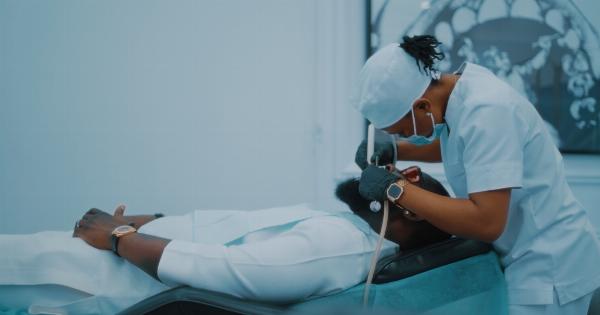Have you ever found yourself suddenly experiencing a series of uncontrollable jerks in your diaphragm, followed by a peculiar sound? Yes, we are talking about hiccups! We have all experienced them at some point in our lives, and while they may seem harmless, hiccups can sometimes be quite bothersome and even lead to a scare or two. In this article, we will delve into the causes of hiccups, debunk some common myths surrounding them, and explore ways to prevent and treat hiccups effectively.
The Mechanism of a Hiccup
Before we begin, it is essential to understand the mechanism behind a hiccup. A hiccup occurs due to an involuntary contraction or spasm of the diaphragm, the muscle responsible for breathing.
When the diaphragm contracts suddenly, it causes a rapid closure of the vocal cords, resulting in the classic “hic” sound.
The Most Common Causes
While the exact cause of hiccups remains a mystery, certain factors and triggers are commonly associated with the onset of hiccups. Let’s take a look at some of the most common causes:.
1. Eating or Drinking Too Quickly
One of the leading culprits behind hiccups is eating or drinking too quickly. When you consume your food or beverages rapidly, you may swallow air along with them. This excess air can irritate your diaphragm, leading to hiccups.
2. Eating Spicy or Hot Foods
Spicy or hot foods can stimulate the nerves in your esophagus or stomach, potentially triggering hiccups. The sensation caused by these foods may create a disruption in the normal rhythm of the diaphragm.
3. Consuming Carbonated Drinks
Ever noticed that carbonated beverages make you hiccup more frequently? The carbonation in these drinks causes the stomach to become distended, which can irritate the diaphragm and induce hiccups.
4. Sudden Temperature Changes
Drastic temperature changes, such as going from a warm room to a cold one or vice versa, can stimulate the nerves in your throat, leading to hiccups. These changes irritate the diaphragm and disrupt its normal functioning.
5. Emotional Factors
Emotional factors, such as sudden excitement, stress, anxiety, or even laughter, can cause hiccups. These emotional triggers stimulate the nerves and muscles involved in the hiccup reflex.
6. Gastrointestinal Disorders
Underlying gastrointestinal disorders, such as gastroesophageal reflux disease (GERD) or gastritis, can contribute to chronic hiccups.
These conditions cause irritation and inflammation in the gastrointestinal tract, which can affect the diaphragm’s function.
Debunking Hiccup Myths
Throughout the years, several myths and folk remedies have emerged around hiccups. While they may sound intriguing, it’s important to distinguish fact from fiction. Let’s debunk some of the common hiccup myths:.
1. Being Frightened Cures Hiccups
Many people believe that experiencing a sudden fright or scare can cure hiccups. Although this myth may be amusing, there is no scientific evidence to support it.
While a momentary distraction may help alleviate hiccups, there is no cure-all “fright therapy.”.
2. Holding Your Breath Stops Hiccups
Another widespread belief is that holding your breath can put an end to your hiccups. In reality, holding your breath only disrupts the breathing pattern momentarily and does not address the underlying cause of hiccups.
3. Drinking Water Upside Down
Have you ever tried drinking water from the opposite side of the glass to cure hiccups? Although this technique may offer a temporary distraction, it has no scientific basis as a hiccup remedy.
Effective Ways to Treat Hiccups
While hiccups typically resolve on their own within a short period, they can be quite bothersome during their course. If you are looking for ways to treat hiccups effectively, consider the following suggestions:.
1. Hold Your Breath and Swallow
Inhale deeply and hold your breath for a few seconds. While holding your breath, swallow saliva or take a small sip of water. This technique helps to relax and reset the diaphragm, potentially stopping the hiccups.
2. Gently Pull Your Tongue
This simple yet effective method involves pulling gently on your tongue. By doing so, you stimulate the muscles and nerves connected to the diaphragm, which may help to relieve hiccups.
3. Drink a Glass of Cold Water
Sipping on a glass of cold water can have a soothing effect on the diaphragm. The cold water may help calm the spasms and halt the hiccups.
4. Breathe into a Paper Bag
Breathing into a paper bag helps regulate your breathing patterns, increasing the carbon dioxide levels in your blood. This controlled breathing technique can aid in normalizing the diaphragm contractions and, in turn, stop the hiccups.
5. Apply Gentle Pressure on Your Eyeballs
Though it may sound peculiar, gently pressing your eyeballs with your fingers can stimulate the vagus nerve, which plays a role in controlling the hiccup reflex. Be careful not to apply too much pressure.
Preventing Hiccups
While it may not be possible to completely prevent hiccups, there are certain measures you can take to minimize their occurrence. Consider the following tips:.
1. Eat and Drink Slowly
Eating and drinking slowly can minimize the amount of air you swallow, reducing the likelihood of developing hiccups. Take your time and savor each bite and sip.
2. Avoid Overeating
Overeating can put pressure on the diaphragm and increase the chances of experiencing hiccups. Opt for smaller, more frequent meals rather than large portions in one sitting.
3. Limit Carbonated and Spicy Foods
Reducing your intake of carbonated and spicy foods can help prevent hiccups. Opt for milder alternatives to minimize the chances of irritating your diaphragm.
4. Manage Stress and Emotional Triggers
Practicing stress management techniques, such as deep breathing exercises, meditation, or engaging in hobbies, can help reduce the frequency of hiccups triggered by emotional factors.
5. Avoid Extreme Temperature Changes
Whenever possible, try to avoid sudden and drastic temperature changes, as they can stimulate the nerves and lead to hiccups. Dress appropriately for the weather and transition gradually between different environments.
Conclusion
While hiccups may have caused a scare or embarrassment on more than one occasion, understanding their causes can help prevent and manage them effectively.
Whether it’s related to your eating habits, emotional triggers, or underlying gastrointestinal issues, identifying the root cause and implementing appropriate measures can minimize the occurrence and duration of hiccups. So the next time you find yourself in the midst of a hiccup episode, you’ll be well-equipped to handle it with ease.





























